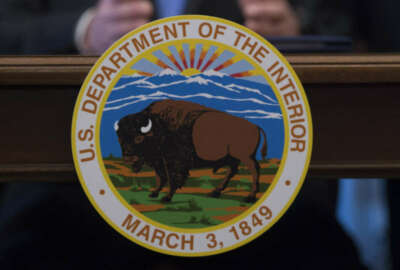
Norton, Wexton seek justification for BLM relocation move
D.C. Delegate Eleanor Holmes Norton and Virginia Congresswoman Jennifer Wexton are trying to block the Bureau of Land Management relocation with new legislation.
To listen to the Federal Newscast on your phone or mobile device, subscribe on PodcastOne or Apple Podcasts. The best listening experience on desktop can be found using Chrome, Firefox or Safari.
- Del. Eleanor Holmes Norton (D-D.C.) and Rep. Jennifer Wexton (D-Va.) have offered new legislation to block the Bureau of Land Management’s plan to relocate hundreds of employees out of Washington, D.C. In July, the Trump administration announced that it would move the headquarters of the Bureau of Land Management out of Washington and relocate it to Grand Junction, Colorado. In a news release, Wexton said nearly 95% of BLM employees are already located out in the field. Both Norton and Wexton said they haven’t seen appropriate justification or data to support the planned move. (Rep. Jennifer Wexton)
- The Agriculture Department has asked its employees at the Economic Research Service (ERS) and National Institute of Food and Agriculture (NIFA) who previously declined relocation to Kansas City, to work longer in Washington, D.C. USDA said it’s changing the report date to Kansas City for employees on three teams at the ERS to Dec. 9. The report date for three NIFA teams has been bumped back to March 30, 2020. The American Federation of Government Employees said it’s concerned the new dates could jeopardize severance or buyout payments due to employees who have already said they plan to leave. (Federal News Network)
- Rep. Ro Khanna (D-Calif.) is asking for more details from the Defense Department about how it’s recommending service members secure their mobile devices. In a letter to CIO Dana Deasy, Khanna said he wants to know if Deasy has any concerns about foreign actors trying to access DoD employees’ personnel devices. Khanna said he hopes the Pentagon’s requirements can inform other agencies as they protect their data and mobile devices. (Ro Khanna)
- The Pentagon appears to be dragging its feet on Congressional directives telling it to embrace open source software. Nearly two years ago, Congress ordered DoD to release at least 20% of its custom-developed software code as open source so it could be used across the rest of the government. But the Government Accountability Office said the department is still below the 10% mark. The law and OMB directives also told DoD to develop a department-wide policy on open source software. It hasn’t yet, but said it hopes to do so by the end of the year. (GAO)
- The Navy has announced its third phase in improving permanent changes of station through its MyPCS Mobile App. The newest phase automates the travel voucher process. Sailors can upload images of receipts on their mobile device during a move and complete a travel voucher with basic, pre-populated information. The form can also be signed electronically and sent to their command pay and personnel administrator for review. (Navy)
- The Defense Department said 90 more current and former Army and Army National Guard installations have drinking water contamination from firefighting foams. There are now 297 facilities with known contamination from the chemicals which have been linked to cancers, thyroid disease and issues with the reproductive and immune system. (Environmental Working Group)
- The Office of Personnel Management has permanent leadership again. The Senate confirmed Dale Cabaniss to be the next OPM director by a 54-38 vote. She replaced Margaret Weichert, who had been serving concurrently as the OPM acting director and the deputy director for management at the Office of Management and Budget. OPM has an uncertain future. The Trump administration wants the General Services Administration to take over its transactional functions, and move its policy shop to the White House. That plan faces opposition from congressional Democrats and from federal employee unions. (Federal News Network)
- The Senate also confirmed Jim Byrne to be the permanent deputy secretary for the Department of Veterans Affairs. Byrne has been VA’s acting deputy secretary and general counsel for about a year. He earned his confirmation with a 81-11 vote. (Senate)
-
The Energy Department is looking for industry feedback on who should serve on its National Quantum Initiative Advisory Committee. The board consists of 22 members chosen by DOE and tasked with giving the president regular updates on the state of quantum technology. Scientists are using the technology to develop new kinds of computers and communications networks. (National Register)
-
The National Institute of Standards and Technology said there is no one-size fits all approach to balancing the need to keep data private and maximize its use. This is why NIST’s new draft privacy framework provides strategies and different types of protections to minimize privacy risks while still letting organizations accomplish their mission. NIST said it used a similar approach in this draft document to what it did with its cyber framework. The privacy framework is split into three parts: Core privacy protections; profiles to determine the most important activities; and implementation through a risk management lens. Comments on the draft framework are due by Oct. 24. (NIST)
Copyright © 2025 Federal News Network. All rights reserved. This website is not intended for users located within the European Economic Area.



